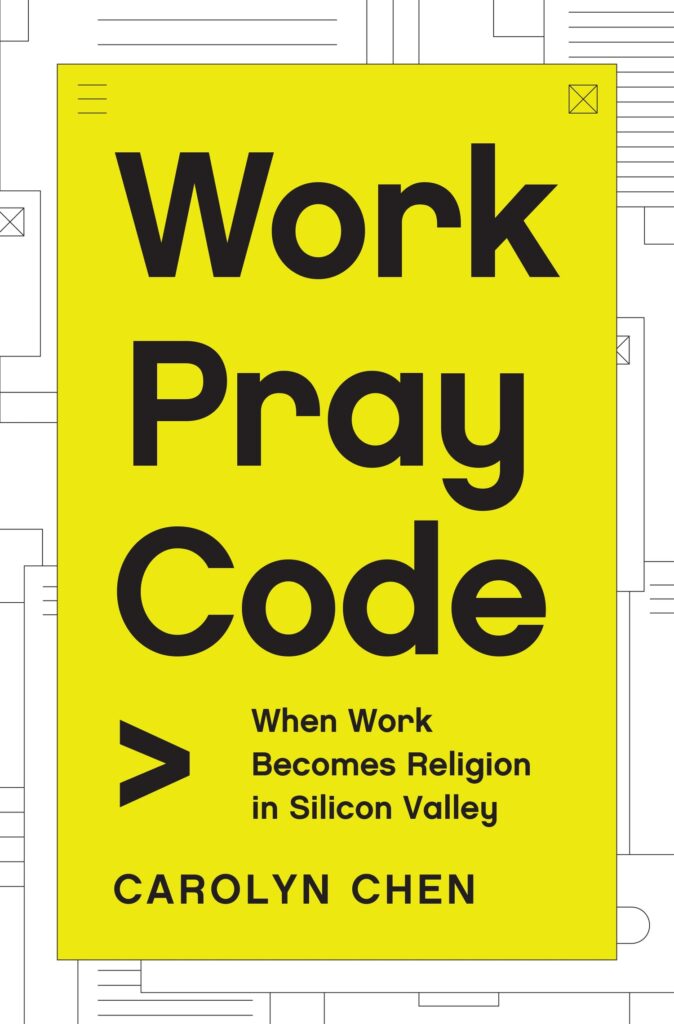In this September 30 “Author Meets Critics” panel, Carolyn Chen, Associate Professor in the UC Berkeley Department of Ethnic Studies, will present her book, Work Pray Code: When Work Becomes Religion in Silicon Valley. Professor Chen will be joined in conversation by Arlie Hochschild, Professor Emerita in the UC Berkeley Department of Sociology, and Morgan Ames, Assistant Professor of Practice in the UC Berkeley School of Information and Associate Director of Research for the Center for Science, Technology, Medicine and Society.
This hybrid event will be held in person at Social Science Matrix, 820 Social Sciences Building, on the UC Berkeley campus. We will also broadcast the event via Zoom and will send a link to registrants prior to the event.
Co-sponsored by the Berkeley Center for the Study of Religion and the Berkeley Haas Culture Initiative.
About the Book
Silicon Valley is known for its lavish perks, intense work culture, and spiritual gurus. Work Pray Code explores how tech companies are bringing religion into the workplace in ways that are replacing traditional places of worship, blurring the line between work and religion and transforming the very nature of spiritual experience in modern life.
Over the past forty years, highly skilled workers have been devoting more time and energy to their jobs than ever before. They are also leaving churches, synagogues, and temples in droves—but they have not abandoned religion. Carolyn Chen spent more than five years in Silicon Valley, conducting a wealth of in-depth interviews and gaining unprecedented access to the best and brightest of the tech world. The result is a penetrating account of how work now satisfies workers’ needs for belonging, identity, purpose, and transcendence that religion once met. Chen argues that tech firms are offering spiritual care such as Buddhist-inspired mindfulness practices to make their employees more productive, but that our religious traditions, communities, and public sphere are paying the price.
We all want our jobs to be meaningful and fulfilling. Work Pray Code reveals what can happen when work becomes religion, and when the workplace becomes the institution that shapes our souls.
Co-sponsored by the Berkeley Center for the Study of Religion (BCSR).
Use the code WPC30 to purchase this book at a 30% discount from the Princeton University Press website.
Panelists
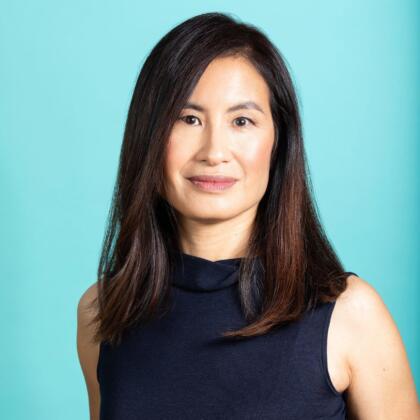 Carolyn Chen is Associate Professor of Ethnic Studies at UC Berkeley. She is the author of Getting Saved in America: Taiwanese Immigration and Religious Experience (Princeton 2008) and co-editor of Sustaining Faith Traditions: Religion, Race and Ethnicity among the Latino and Asian American Second Generation (NYU 2012). Her new book, Work Pray Code: When Work Becomes Religion in Silicon Valley, was published by Princeton University Press. Professor Chen received her doctorate in Sociology from UC Berkeley in 2002. Prior to teaching at Berkeley, she was Associate Professor of Sociology and Asian American Studies at Northwestern University, where she served as Director of the Asian American Studies Program. At UC Berkeley, Professor Chen is Co-Director of the Berkeley Center for the Study of Religion, a member of the Center for Chinese Studies, and the Religious Diversity Cluster at the Othering and Belonging Institute, and an affiliate in the Department of Sociology.
Carolyn Chen is Associate Professor of Ethnic Studies at UC Berkeley. She is the author of Getting Saved in America: Taiwanese Immigration and Religious Experience (Princeton 2008) and co-editor of Sustaining Faith Traditions: Religion, Race and Ethnicity among the Latino and Asian American Second Generation (NYU 2012). Her new book, Work Pray Code: When Work Becomes Religion in Silicon Valley, was published by Princeton University Press. Professor Chen received her doctorate in Sociology from UC Berkeley in 2002. Prior to teaching at Berkeley, she was Associate Professor of Sociology and Asian American Studies at Northwestern University, where she served as Director of the Asian American Studies Program. At UC Berkeley, Professor Chen is Co-Director of the Berkeley Center for the Study of Religion, a member of the Center for Chinese Studies, and the Religious Diversity Cluster at the Othering and Belonging Institute, and an affiliate in the Department of Sociology.
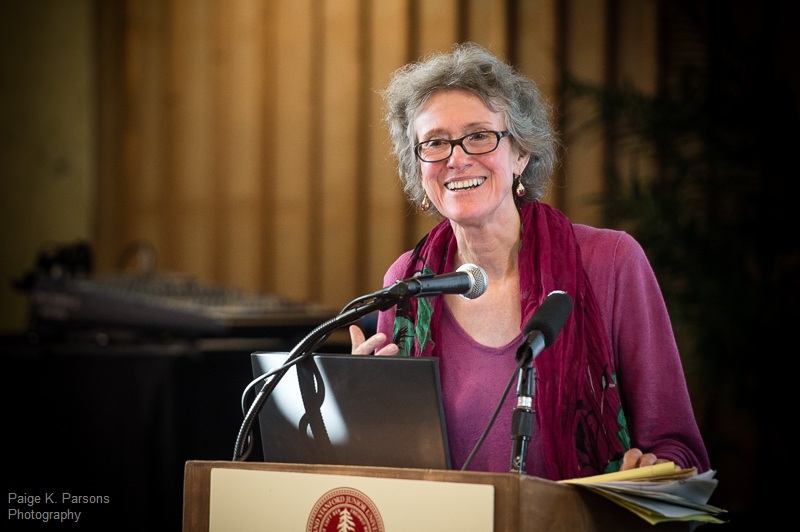 Arlie R. Hochschild‘s research focuses on the rise of the American right, the topic of her book, Strangers in Their Own Land: Anger and Mourning on the American Right (The New Press, September 2016), a finalist for the National Book Award. Based on intensive interviews of Tea Party enthusiasts in Louisiana, conducted over five years and focusing on emotions, she tried to scale an “empathy wall” to learn how to see, think and feel as they do. In The Outsourced Self: Intimate Life in Market Times, she explored the shifting boundary between market and intimate life and methods by which individuals manage that boundary to keep personal life feeling personal. In 2013, she wrote So How’s The Family and Other Essays, a sampler of an applied sociology of emotion. It includes essays on emotional labor—when do we enjoy doing it and when not?—empathy, personal strategies for handling life in a time bind, and the global traffic in care workers. Earlier work was based on field work among older residents of a low-income housing project, (The Unexpected Community), flight attendants and bill collectors who perform “emotional labor” (The Managed Heart), working parents struggling to divide housework and childcare (The Second Shift), corporate employees dealing with a corporate culture of workaholism (The Time Bind), and Filipina nannies who’ve left their children behind to care for those of American families (Global Woman). Her work is available in 16 languages.
Arlie R. Hochschild‘s research focuses on the rise of the American right, the topic of her book, Strangers in Their Own Land: Anger and Mourning on the American Right (The New Press, September 2016), a finalist for the National Book Award. Based on intensive interviews of Tea Party enthusiasts in Louisiana, conducted over five years and focusing on emotions, she tried to scale an “empathy wall” to learn how to see, think and feel as they do. In The Outsourced Self: Intimate Life in Market Times, she explored the shifting boundary between market and intimate life and methods by which individuals manage that boundary to keep personal life feeling personal. In 2013, she wrote So How’s The Family and Other Essays, a sampler of an applied sociology of emotion. It includes essays on emotional labor—when do we enjoy doing it and when not?—empathy, personal strategies for handling life in a time bind, and the global traffic in care workers. Earlier work was based on field work among older residents of a low-income housing project, (The Unexpected Community), flight attendants and bill collectors who perform “emotional labor” (The Managed Heart), working parents struggling to divide housework and childcare (The Second Shift), corporate employees dealing with a corporate culture of workaholism (The Time Bind), and Filipina nannies who’ve left their children behind to care for those of American families (Global Woman). Her work is available in 16 languages.
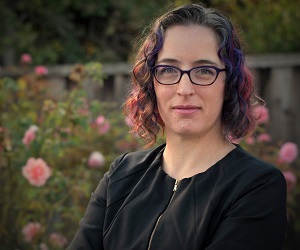 Morgan Ames is an Assistant Professor of Practice in the School of Information and Associate Director of Research for the Center for Science, Technology, Medicine and Society at UC Berkeley. Morgan researches the ideological origins of inequality in the technology world, with a focus on utopianism, childhood, and learning. Her book The Charisma Machine: The Life, Death, and Legacy of One Laptop per Child (MIT Press, 2019), draws on archival research and ethnographic fieldwork in Paraguay to explore the cultural history, results, and legacy of the OLPC project. The book won the 2020 Best Information Science Book Award, the 2020 Sally Hacker Prize, and the 2021 Computer History Museum Prize. Her next project extends the questions regarding the interaction between computers, ideology, and identity to explore the role that utopianism plays in discourses around childhood, education, and ‘development’ in Silicon Valley and the San Francisco Bay Area.
Morgan Ames is an Assistant Professor of Practice in the School of Information and Associate Director of Research for the Center for Science, Technology, Medicine and Society at UC Berkeley. Morgan researches the ideological origins of inequality in the technology world, with a focus on utopianism, childhood, and learning. Her book The Charisma Machine: The Life, Death, and Legacy of One Laptop per Child (MIT Press, 2019), draws on archival research and ethnographic fieldwork in Paraguay to explore the cultural history, results, and legacy of the OLPC project. The book won the 2020 Best Information Science Book Award, the 2020 Sally Hacker Prize, and the 2021 Computer History Museum Prize. Her next project extends the questions regarding the interaction between computers, ideology, and identity to explore the role that utopianism plays in discourses around childhood, education, and ‘development’ in Silicon Valley and the San Francisco Bay Area.
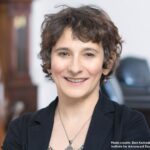 Marion Fourcade (moderator) is Director of Social Science Matrix and Professor of Sociology at UC Berkeley. She specializes in the comparative history and sociology of the social sciences and in the study of classification and valuation processes. Her current work focuses on new forms of stratification, morality and profit in the digital economy.
Marion Fourcade (moderator) is Director of Social Science Matrix and Professor of Sociology at UC Berkeley. She specializes in the comparative history and sociology of the social sciences and in the study of classification and valuation processes. Her current work focuses on new forms of stratification, morality and profit in the digital economy.
